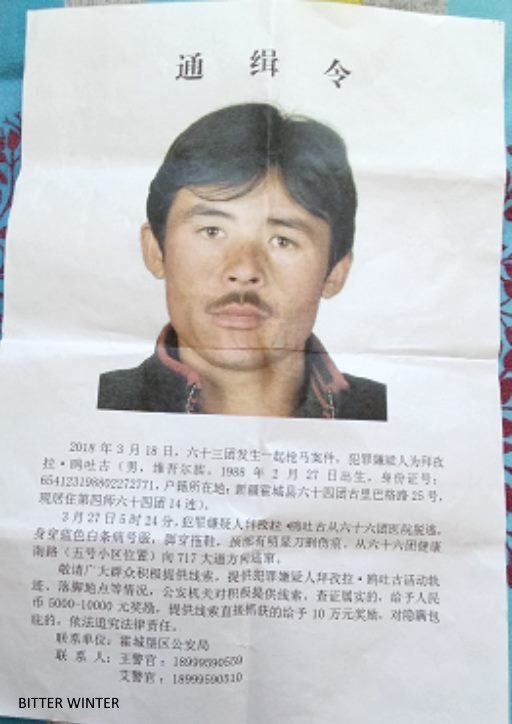Pazil Utuⱪ, an Uyghur Muslim from an old and well-known Muslim family in Xinjiang, was shot dead after a massive manhunt mobilizing over 70,000 police officers and political agents.

Thirty-year-old Pazil Utuⱪ, an ethnic Uyghur, came from an old and well-known Muslim family, which explains the extraordinary measures taken by authorities to detain him. He was from the 64th Regiment in Huocheng County, Yili Prefecture. He was hiding trying to escape internment in “transformation through education” camps when authorities mobilized 70,000 people in a massive manhunt to find him. On April 1, 2018, the police finally found Pazil Utuⱪ and shot him dead.
In May 2017, Pazil Utuk was arrested by local government officials during a religious service for “participating in unlawful religious activities,” and was released only in August. Local authorities continued to monitor him as a “key target in the control of radical Islam,” and his name was put on a list of people the government tracks at all times, putting him in danger of arrest at any time. On March 16 and 17, 2018, local officials notified Pazil Utuⱪ twice that he should report at a “transformation through education camp.” To evade forceful indoctrination, he borrowed 700 RMB from his elder sister, left his home at the 64th Regiment on foot, and walked to the neighboring 63rd Regiment to hide out.
On March 18, Pazil Utuⱪ decided it was safer to hide in a small island, and asked a Kazakh herder to borrow a horse to cross the river. He agreed to return the horse after arriving at the island. Concerned that his horse might be stolen, the herder decided to consult his family and friends and sent them texts via the Chinese social media site WeChat. Through the messages, the Regiment leaders, the police, and other officials learned of Pazil Utuⱪ’s whereabouts and rushed to mobilize people for his arrest.
The police found Pazil Utuⱪ on the island and immediately opened fire. To escape arrest, he cut his own throat with a knife, preferring suicide to detention in the dreaded camp. However, he was captured alive and sent to the 66th Regiment Hospital for treatment. While at the hospital, police agents watched over him in shifts, day and night. Gradually, he regained his strength. At 5:24 a.m. on March 27, Pazil Utuk noticed that the police officer on duty was asleep and escaped from the hospital by climbing over the wall to escape.
The Urumqi Party secretary, Chen Quanguo, issued an order to capture Pazil Utuⱪ dead or alive. The Houcheng County Public Security Bureau then issued a warrant for his arrest for the crime of “horse theft.” The local government mobilized over 70,000 people from seven different regiments to contain the entire city and find him, a strange move if Pazil’s crime was a mere “horse theft” only. Even more disproportionate for a case of “horse theft” was that schools and hospitals in the area were ordered to shut down, factories were closed, and spring farming was halted. The police stationed sentries at every intersection, avenue, and alley, and ordered the seven regiments’ agents to work double shifts to look in every inch of the area in a blanket search, day and night.
On April 1, Pazil Utuⱪ was found on a culvert in Liangfanchang, at the Huocheng County border, underneath a bridge. Once the police arrived, they opened fire and killed him on site.
Bitter Winter has learned that, since Pazil Utuk first escaped, harassment and arrests extended to his whole family. After he was shot dead, the police detained all those whose names were found in the contacts list of his cell phone.
We also learned that the Chinese Communist Party was not happy that it took so long to find and kill Pazil Utuk, and punishments were applied. Thirty-two people in the 64th Regiment were penalized to varying degrees, from the leading cadres down to the company leaders. Police force cadres were stripped of their positions and Party memberships, and the Special Police Regiment leaders were all fired. The Political and Legal Committee secretary and the bureau director were also let go. All were given disciplinary punishments, and some were even detained.
Source: BITTER WINTER












